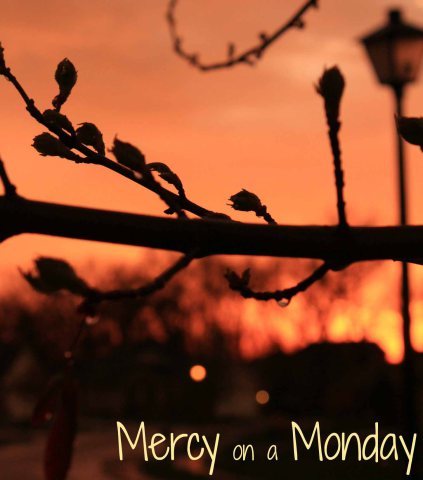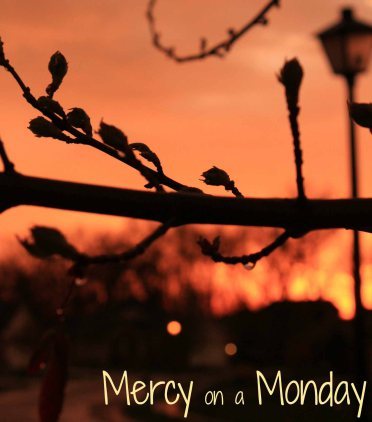Kathleen M. Basi's Blog, page 22
November 21, 2016
What if Thanksgiving Wasn’t Just One Day?
I took some heat last spring after I published my rant on the topic of Mothers Day. But in the months since, I’ve come to realize what was bothering me was the question of gratitude, and what precisely that means.

Image by KateWares, via Flickr
As mothers (and fathers!), we do a lot for our kids. We give and give and give until we’re worn out. And the thing is, we don’t really need to be told “thank you.” Right? Wouldn’t we all rather our kids show us their appreciation every day, rather than getting cards and crafts and/or a fancy dinner one day a year?
If your answer to that question is “no,” this post probably isn’t for you.
But if your heart lit up, going “Yes, yes yes!”, then it’s worth thinking about Thanksgiving as if we were the kids in that equation, rather than the parents.
In other words: Does God (or the great nation of America, if you’re not the believing type) want/need our “I’m grateful for” lists on this on one day, only to have us revert to business as usual the following day? Or would the world–and not coincidentally, we–be better off if we showed our gratitude in our actions on Thanksgiving Day and every other day, too?
(In case you’re wondering, that’s what you call a rhetorical question.)
My point is this:
If I am grateful for the roof over my head and the food on my table, the best way to show it is to do something to ease the suffering of those who don’t have the same benefits.
If I am grateful for my spouse and children, the way to show it is not to focus on what annoys me about him/her/them, but on what makes them such a gift in the first place.
And if I am grateful for the gift of free speech, I should not abuse it by hurling insults, invectives, half-truths, false news stories and outright lies at anyone, no matter how high the stakes.
In other words, the best way to honor Thanksgiving is by living out mercy.

Image by peregrine blue, via Flickr
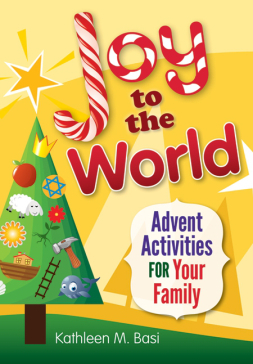 If you use Joy to the World: Advent Activities For Your Family during Advent, I’d like to suggest that the Advent Calendar is a really good way to put this idea into practice. Why? It offers a structure, and structure can make the difference between lasting change and a quick reversion to “business as usual.” Here are a few ideas to stuff your Advent calendar with mercy in motion:
If you use Joy to the World: Advent Activities For Your Family during Advent, I’d like to suggest that the Advent Calendar is a really good way to put this idea into practice. Why? It offers a structure, and structure can make the difference between lasting change and a quick reversion to “business as usual.” Here are a few ideas to stuff your Advent calendar with mercy in motion:
Pull a page (or a few!) from the Random Act of Kindness calendar
Make dinner and take it to a homeless shelter. (Make it communal by asking for help from friends on Facebook.)
Ring the Salvation Army Bell.
Go Christmas caroling and collect canned goods for the local food bank.
Choose a charity and let the kids donate from their piggy banks, or do chores to earn money to contribute.
Make gift bags with cereal packets, water bottles, gloves & scarves for homeless people.
Have the kids help pick out Christmas gifts for families in need, via giving trees or Toys for Tots.
What other kid-friendly ways have you found to teach the practice of mercy?
And with this post, and the last week of the Church year, we farewell Mercy on a Monday. Thanks for joining me on this journey.


November 17, 2016
My Life With Down Syndrome
My life as a parent of a child with Down syndrome involves…
1. Hilarious, irrational leaps. Take this, the opinion paper she wrote for school this week.
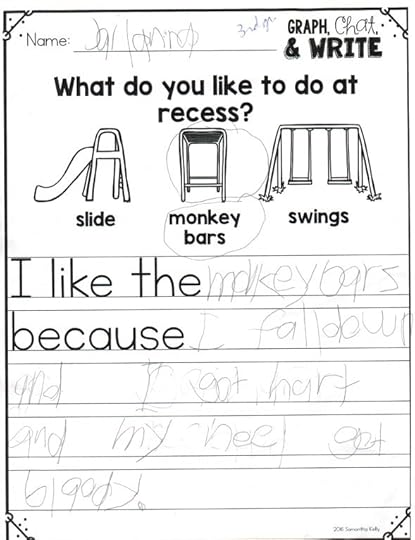
“I like the monkey bars because I fall down and I got hurt and my heel get big” ….um…I’m not sure I know what that last line actually says. But hey. There’s a period at the end and spaces between the words. That’s a very big deal. ***Note***: a helpful commenter says, “My heel got bloody.” Which, in case anyone is wondering…it didn’t. Hence, “irrational leaps of logic.”
2. A compartmentalization of things that other kids do in an integrated way. For instance: writing. In elementary school, writing is practiced in tandem with things like opinion papers and spelling. But in talking to Julianna’s teacher at her parent-teacher conference, I realized that when they really need to test her knowledge, the adults act as her scribe, because—as you saw above—writing for this nine-year-old girl is a challenge all its own.
3. A certain difficulty in pinning down “age-appropriate.” When Alex was her age, he was treated much differently. Actually, her 7-year-old brother has more responsibility and expectations placed upon him than she does at age nine. I’m constantly trying to discern what’s appropriate to ask of her and what is the appropriate way to treat her. She doesn’t understand as much—but I often suspect that she understands more than she wants us to think she does. The thing about having a high EQ and a low IQ is that you know how to manipulate without even realizing you are doing it.
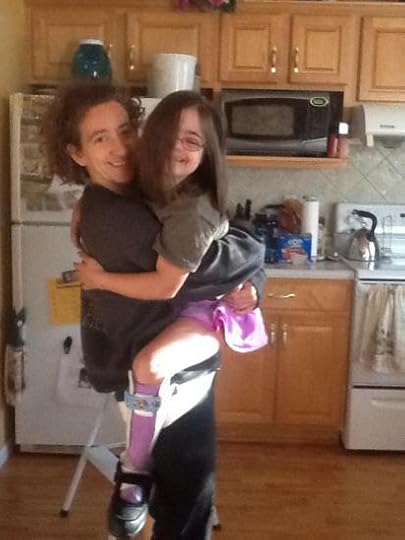
For instance: is it age appropriate to carry around a 9 year old, just because you still can?
4. A bigger difficulty in pinning down “socially appropriate.” Julianna has a gift for love, and many, many people respond to her with joy. She can brighten people’s days. We like to give her as much freedom as we can, because she is such a great ambassador for Down syndrome. She’s high functioning and cute and enthusiastic about, well, everything.
But it’s not universal. She lights up whenever she sees babies or girls her size, and she wants to be friends. But not all mamas are okay with random girls coming over and loving on their babies. And not all little girls want to be attached to by a child with a disability. Not long ago I witnessed a girl close to her own age—someone who knows her well—react to having to stand beside Julianna and hold her hand with the classic “Ugh, I don’t LIKE her” look that all of us seem to know instinctively. I wanted to cry.
5. Having to keep a close eye on her. As hard as it is for her to get around, and as many $4500 inserts and 7-and-counting orthotist appointments as it takes to get her mobile, she can be freakishly easy to misplace! This past weekend, for instance, we went to a display of gingerbread houses, and when it was time to go, I had a lot of trouble separating her from the “friend” she had attached herself to. I did that before rounding up the boys, both because I knew it would take some time, and I didn’t need Michael Mayhem running around while I was doing so. So once I had Julianna, we went to get the boys. But Nicholas was stubbornly insisting he had to finish coloring this one craft. And by the time I got him convinced that it was time to go—even though it took only about 2 minutes—Julianna was gone. I did a quick sweep of the room and then went out in the hotel lobby and asked the staff if they’d seen her. Because she’s kind of distinctive, you know. Nobody had seen her.
Pretty soon we had four staff members searching the hotel bathrooms and the larger premises, while I went around the displays again in earnest. And then, having eliminated the indoors, we headed outside, where we found a staff member coming back with Julianna—who, knowing it was time to go—had simply gone by herself out to the van!
6. Hearing a lot about fire drills. Drills of any kind, actually. She’s rather obsessed with them, in fact. We’re not sure if it’s fear of the noise, or just one of those things.
7. A very streamlined view of life. She loves music, books, babies, and people. And Sofia the First. And she’s starting to get computer literate enough that I keep coming to the computer and finding the search “Swofia hte frist,” with the distinctive purple-gowned little girl.
That’s a sliver of what my life is like with Down syndrome. Are there other DS parents who’d like to share what your “slivers” look like?


November 14, 2016
Blankets, Anyone?
Lots of people right now are looking for ways to serve. Here’s a great one: blankets for refugees! But it comes with an expiration date: they must have the blankets in Virginia by Nov. 30. We all have been given lots of baby blankets, right? And most of them saw very little use and are still in very good shape, lying on the shelf gathering dust? Launder them, box them up and let them be your love letter to the world.


November 10, 2016
Kid Moments, To Brighten Your Day
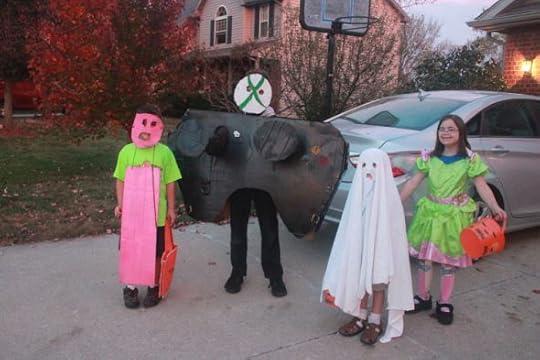
Pinkeye, Xbox remote, blue-blooded ghost, and Tinker Bell
Alex, 11, as we pull in the driveway after school: “You guys used 30 pronouns in the time between the stop sign by the pool and here.”
Me: “Were you counting?”
Alex: “Yes, and that was another one.”
**
Julianna, 9, in the van, listening to Puff the Magic Dragon on the beat-up Peter, Paul & Mommy CD: “…AND FOCKUS IN DEE AUTUMN MIST…”
Me, because there are way too many words that, in the mouth of a child with speech problems, turn into the F-bomb: “Julianna. Frrrrrrrrrollllllllicked.”
Julianna: “Frrrrrrooooccc—frrrrroolllllllick.”
Me: “That’s it! Good!”
Julianna: “PUFF THE MADZIC DRAGON LIVE BY DA SEA AND FOCKUS IN DEE AUTUMN MIST…”
Me: (Face palm.)
**
Nicholas, 7, making his breakfast the day after throwing up.
Me: “Nicholas, have you had any funny moments lately?”
Nicholas: “No.”
Well, there you go.
**
Michael, 4 11/12, on Halloween, wearing a sloppily-cut sheet spattered with blue paint, made by Mom, who is not the whiz of Halloween costuming in the house. He is tripping over his hem, and the sheet keeps getting pulled sideways, so the eye holes are nowhere near his eyes.
Michael: “It’s HARD to be a ghost!”
And finally…this year, it’s official: We’ve had Christmas carols for 12 months straight. They never stopped singing them the entire year.
Parenthood. A nonstop adventure.


November 9, 2016
Division and Unity

Photo by Thomas Hawk, via Flickr
It was the stark division of color that struck me.
As we watched the map turn from neutral to red or blue last night, the analysts’ monologues were all about urban and rural. I flashed back to an article I read earlier in the election season, which talked about rural voters’ support for Trump as a reaction to losing their way of life–not that they think they’re losing it, but that they are. (Well worth reading, but–language alert.)
Watching that sea of red develop in every state they zoomed in upon, with these pockets of blue concentrated around metro areas, was heartbreaking. It underscored the fact that we have lost the willingness, if not the ability, to empathize with the pain of the Other. For quite a while, I’ve been coming down pretty hard on people unwilling to consider or empathize with the problems faced by urban dwellers. In the past year, I’ve heard a lot of rural people refuse to give credence to the protests of those who experience racial injustice, for instance.
But looking at that map last night underscored that I’ve heard big fat crickets from urban people on the topics of concern to rural voters, too. Except guns, of course. Nobody’s allowed to ignore the NRA. But the truth is, we can’t even get a regular acknowledgment in our churches’ weekly prayers of the needs of the farmers who fill our tables. And that’s here in mid-Missouri, where the combines and grain elevators are only a ten-minute drive away. In the major urban centers, where thousands of people have never heard of a combine, let alone seen one, it’s surely worse.
It’s been a horrible election cycle, crowning a decade or two of increasingly horrible election cycles. We can say what we want about the nastiness of the rhetoric in the campaigns, but the rhetoric is at least as bad in our own conversations and social media comments. And when, at 3:30a.m., I knew there would be no more sleeping for me this night, I realized the only thing to do was to pray. Pray that the ascendance of this incredibly divisive new president will act as catalyst for a real change in our country. Not a change of policy at the national level–those will forever wax and wane–but a change of heart for each and every one of us. I pray that this will shock us all into realizing what we have done by refusing to be open to each other–by refusing to recognize the pain of the Other and make it our own.
Then, and only then, will we again be one nation under God, indivisible, with liberty and justice for all.
Related:
Mercy (or the lack of it) on the road to the White House
It’s Not Just What You Say–It’s How You Say It


November 7, 2016
Ten Simple Ways To Model Mercy For Your Kids
 As the Year of Mercy winds down, I thought I’d bring things down to a practical level. As parents, we have primary responsibility for forming our kids’ view of and approach to the world. Providing a good example alone isn’t enough—we do have to teach—but it’s a darned good start. Here are ten simple ways to model mercy in the mist of your everyday life.
As the Year of Mercy winds down, I thought I’d bring things down to a practical level. As parents, we have primary responsibility for forming our kids’ view of and approach to the world. Providing a good example alone isn’t enough—we do have to teach—but it’s a darned good start. Here are ten simple ways to model mercy in the mist of your everyday life.
1. Take a deep breath and say a prayer before reacting to whining, breakage, spillage, or fighting. It doesn’t have to be fancy or particularly eloquent. I think the most fervent prayer I ever pray is: “Lord, help!” (I use that one a lot. Ahem.)
2. Measure your words when discussing political candidates, work associates, and others who upset you. For many of us, speech is where mercy disappears first.
3. Lead the way in mending hurts. You may have to send your kid to his room when he’s behaving badly, but go in and offer love—cuddles for little ones, gentle words for older ones—as soon as you’ve calmed down.
4. Banish “It’s okay” from conflict resolution—because if there truly was an offense, then it isn’t okay. Instead, take a deep breath and embrace the difficult words “I forgive you.”
5. Instead of trying to resell your kids’ outgrown clothes (or yours, for that matter), donate them. School nurses always need clothes. So do shelters for abused kids and battered women. There’s also Goodwill, and USAgain bins (for usable clothing) and PlanetAid (for holey socks and threadbare shirts).
6. Keep protein bars, water bottles, or jars of peanut butter and sleeves of crackers in the car so you have something nonperishable to give to the homeless who beg at major intersections.
7. Make a family charity jar. Give your kids the chance to do small chores, and afterward let them put $.25-.50 in the jar. When it’s full, choose a charity as a family.
8. Donate blood. (You don’t even have to take your kids along. Because you know if they see the tape around your arm they’ll ask about it!)
9. Help with funerals in your local community.
10. Offer child care, kid transportation, adult transportation, grocery shopping services, or lawn care to an individual or family facing illness.
Practicing mercy doesn’t have to be dramatic or time-consuming. Small, simple, and realistic beats grand gestures every time.
How do you model mercy in your home?
Related Posts:


November 3, 2016
When you are completely blank…
 …you lead with a big congratulations to the Cubs and their devoted fans!
…you lead with a big congratulations to the Cubs and their devoted fans!
It’s been harder and harder to come up with blog posts lately, because I’m trying to figure out what I have to say that people actually want to hear. It’s become such a block for me that last Thursday, I forgot about blogging altogether until 4:30 in the afternoon, at which point I just had to wince and say I’ve missed my first deadline…ever.
It’s not that I’m not writing–I’m about to finish a first draft of a brand new novel, one that got written in about 5 weeks, as a matter of fact. (It’ll be two or three more major revisions before it’s ready, but getting the skeleton is always the most stressful part for me, and this one actually has some meat on it already, which is a pretty amazing feeling.) I have a magazine article I’m working on, and a column deadline tomorrow, and I wrote the start of three new songs earlier this week.
I’ve been writing a lot, in other words–but all my energy has gone to those, and I’m finding there’s little in real life worth talking about. No, that’s not true. There’s just not very much in real life that anyone will be interested in reading. (A few weeks ago I got to talk to some women in my parish about writing and the creative process. It was such a high: to talk writing to people who actually WANT TO HEAR ABOUT IT? Even my husband’s eyes glaze over instantly.)
I am frequently too jazzed up to sleep after choir practice; last night was notable only because it was really hot in the house–78 degrees felt comfortable in shorts and a tank top during the day as long as I didn’t process the fact that it was NOVEMBER THE SECOND, but it was too warm for sleeping, even with the help of a melatonin tablet. And then there were the texts from family members watching the crazy game, and then the storm came up and I had to give my place in the bed to Miss Julianna. The couch was not friendly to me last night. And when I did finally sleep, I was awakened by the sound of the kids’ toilet running and running and running…so I had to get up and fix that. And then I laid awake for what I feared was turning into the rest of the night, trying to figure out what to blog about this morning.
You can see how well that turned out. Ahem.
How about sharing the other fruits of my labor: the fall portraits? They were all on Facebook already, but I haven’t posted them here. Maybe by Monday I’ll have something interesting to say again…
Click to view slideshow.


October 31, 2016
The Problem Of Teaching A Child The Faith
It’s got to be tough to be the kid who has two musical parents who are extremely involved in their church. He has a set of gifts that are his birthright—a great ear, the ability to pick out tunes in multiple keys and sometimes even harmonize them, plus a blossoming skill on the piano and the ability to sing. But when he hits a certain age, singing becomes uncomfortable.
And as for the rest, well, when your parents are the poster children for liturgical music, is it any wonder you want to stay as far away from that particular brand of involvement as humanly possible? Everyone expects it. What if you aren’t that good at it? And anyway, why should you HAVE to do something just because you CAN and your parents DO?

What preteen wouldn’t be proud to be the child of these two? Chomping at the bit to be JUST LIKE THEM? (Don’t answer that.)
I can sympathize.
The problem is, none of that changes the fact that our primary responsibility as parents is to raise holy and happy individuals, and I know by my own experience that the best chance of that is through helping him develop an authentic, real-world faith. But an authentic, real-world faith requires sustenance that comes through community worship. And you only “get out of” community worship what you put into it. In other words, you’ve got to participate.
So when I see my child standing in church, somewhat glazed-eyed, his lips moving, but barely, I get twisted into knots. It’s my job to help him find his way into a mature, healthy faith. But I’ve seen myself how pushing too hard can cause a child to push back and reject what he most needs. On the other hand, if we don’t take a proactive role, he’ll fall away anyway, because people don’t just fall into a mature, healthy faith by accident. They need guidance. Mentoring. Others can and will provide those to him in the years to come, but the fact is the primary responsibility is ours; it’s one we took on when we had him baptized.
I just don’t know how to do it right. Punitive measures are clearly ill-advised. What kid is going to respond to “You may not have the XBox unless I can hear you sing at church” with a healthy faith? Um, nobody.
On the other hand, smiling & cajoling doesn’t work, and anyway, it turns into nagging almost instantly.
I think I need to have a heart to heart with him, involve him in the process, and attempt to awaken the sense of the Other inside him, the “there is, in fact, something bigger than me out there.” But I’m not sure of the right way to do that.
I would like to hear from older parents—those with grown kids who have stuck with the faith and made it their own. What wisdom can you offer to those of us in the trenches?


October 24, 2016
#Boycottpolitics2016

Image by twicepix, via Flickr
For weeks, I’ve been debating stepping into the online political fray. I have a lot of opinions, and I’ve been driving around town distilling them into a collection of pithy one-liners that, as a Catholic rather than a Democrat or a Republican, would be certain to offend virtually every single person I know.
Conventional wisdom for writers says “If your professional thing isn’t politics, then shut up about politics. You’ll only shoot yourself in the foot.”
But if we don’t talk about the most important subjects, how can the world ever become a better place?
I began planning my post, and simultaneously praying whether or not I should go forward with it.
On the first day the Spirit reminded me of the importance of quiet.
On the second day, a fiction writing friend told us she was going offline until after the election.
On the third day I read a post, titled “I’m Pro-Life, and I Don’t Care About The Supreme Court“, and made the mistake of continuing on into the comments, where I found multiple examples like this:
“You just want an excuse to continue the racist and genocidal America Holocaust to include partial birth and full birth infanticide and the sale of lucrative murdered baby parts. Give Mrs. Clinton her money back.”
This man signed off with, “God bless, (name),” as if he hadn’t just spewed a mouthful of anything BUT blessing. Worse, he didn’t even seem to recognize the inherent contradiction, or the fact that he was giving the entire prolife movement a bad name.
At the end of Day Three, I got involved in a Facebook conversation preceded by the instructions “be polite and reasonable, please,” in which a particular individual lit into me for what I was saying without even stopping to read it carefully enough to hear what I was, yanno…saying.
And I realized:
It’s time to bow out of this crap.
Since the primary season, I’ve been following, reading, listening, and interacting, and it has done nothing except impoverish my spirit. I am far more anxious; I am constantly grieving the state of humanity. This political season has made it very difficult to cling to my belief in the ability of humanity to approach the world with reason, honesty, good intentions, and empathy.
I still believe that at heart, human beings are good. But we are not showing ourselves to be so this year. Actually, any time politics comes up, the worst parts of ourselves come out to play. But it’s so much worse this year. And it helps nothing, all this vitriol, all this angry, half-thought-out, buy-into-and-regurgitate-whatever-half-truth-mostly-lie-suits-your-political-color. It only hurts our ability to be what we were called to be. It doesn’t just damage the human dignity of the people we’re ripping to shreds. It damages ours, too.
I will vote, of course, although there’s little satisfaction in it this year. But I’m done being a political consumer. Nor will I be adding my collection of pithy one-liners to the fray. It’s bad for me as a human being, and being a good human being is what I am supposed to be doing.
Care to join me? #Boycottpolitics2016


October 20, 2016
The Courage To Be Still

Image via Pixabay
There are 553 books on my Goodreads “to read” list.
I have at least three more flute pieces to write, and I have four novel ideas, one awaiting another major revision, and one that is 3/4 drafted.
Every Tuesday and Thursday, we have two kids out of the house at 6:45 a.m. to get to band; every Wednesday it’s three of them at 7 a.m. for choir; and on Fridays, it’s 6:45 a.m. again for Julianna’s physical therapy. Michael goes to school for three hours in the afternoon, but too many of those hours are chiseled away by appointments and busy work.
All this to say I don’t have time anymore: to scrapbook, to garden, to practice my flute. Sometimes my kids are raiding the clean clothes pile for socks and underwear for almost two weeks before I have time to fold it.
My heart feels frantic. If I opt out of the nasty election news (and there’s plenty of that, isn’t there?), I feel remiss in my duty to be an educated voter and an informed citizen of Planet Earth.. But listening to it undermines my hope in the possibility of a better world. I turn on the radio in the car and I listen and listen and listen as my insides wind tighter and tighter.
And into this smoldering, writhing mass of not-peace drops a headline:
Science Says Silence Is Much More Important To Our Brains Than We Think
I don’t even click through, because I remember reading it before. We need to be still. It’s not just for introverts and aspiring contemplatives. It makes our brains grow, it makes us better people, more cognizant of ourselves and our place in the world. Seeing the headline pop up on my Facebook feed is the road sign from God I didn’t know I was waiting for.
How long has it been since I took time to “come away”? Weeks? Months? I’ve been oh so productive, but I’m feeling disconnected from my life, scrabbling at its messy edges instead of living gut deep.
But the longer I wait to shut down my brain, the harder it is to do so. I get antsy with the quiet in the car. I long to fill it. Nervous with the silence. I play games: I can turn the radio on at the next stoplight. When I turn it on, my addiction to stimulus kicks in and go, “ooh, that’s niiiiice…” for about three seconds, until I realize they’re arguing about something they have no control over at all. I think, “How is this enriching their lives or mine?”
And so, finally, I grit my teeth and summon the courage to enter the stillness for real.
It takes a full day to relax into the silence in the van. A full day for my brain to figure out what to talk about with my ride-along little man, whose last year of small childhood I’ve been so recklessly squandering with all that productivity and serenity-shredding noise.

Image by revmrb, via Flickr
And today, I sit at the edge of a creek, watching the leaves fall: twirling like helicopters, tumbling end over end, dive-bombing the limestone or landing noiselessly on the surface of the water, where they embark on an unhurried journey downstream. Watching them drift out of the shadows and into the sunlight and back again, until they catch on a submerged log or get waterlogged and sink to the bottom to become next year’s silt. Watching the play of sunlight on golden trees and the red-brown carpet of fallen leaves on the steep slope across the way. Pausing to write, and then, again, to summon the courage to be still.
We are made for more than this, but we are also made for this.



